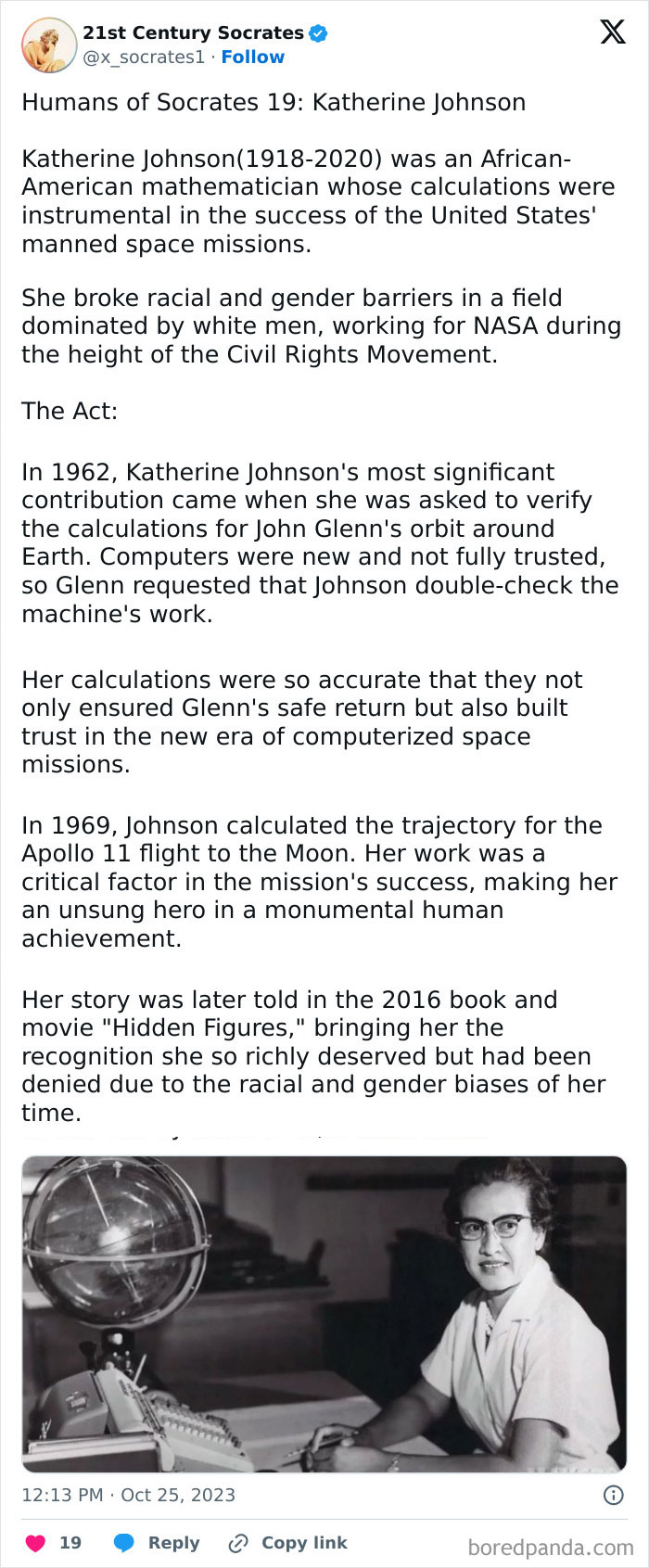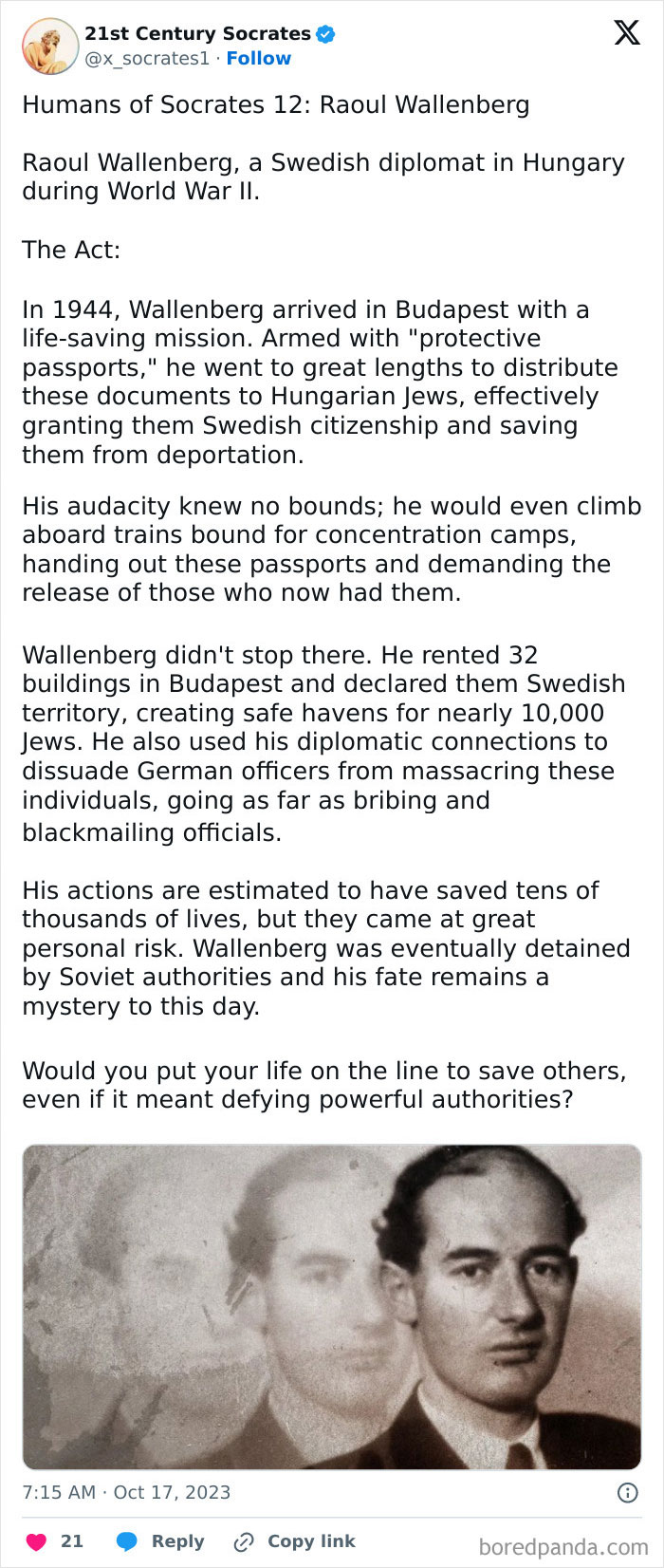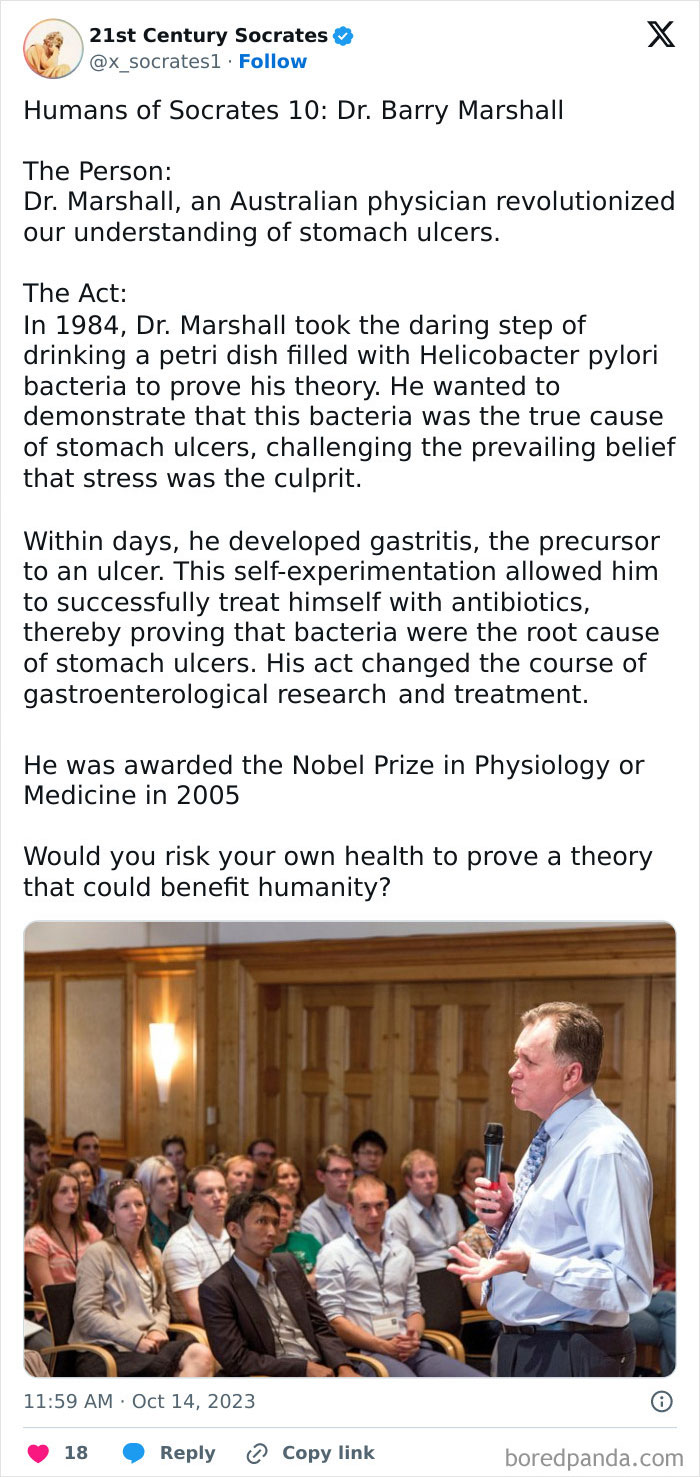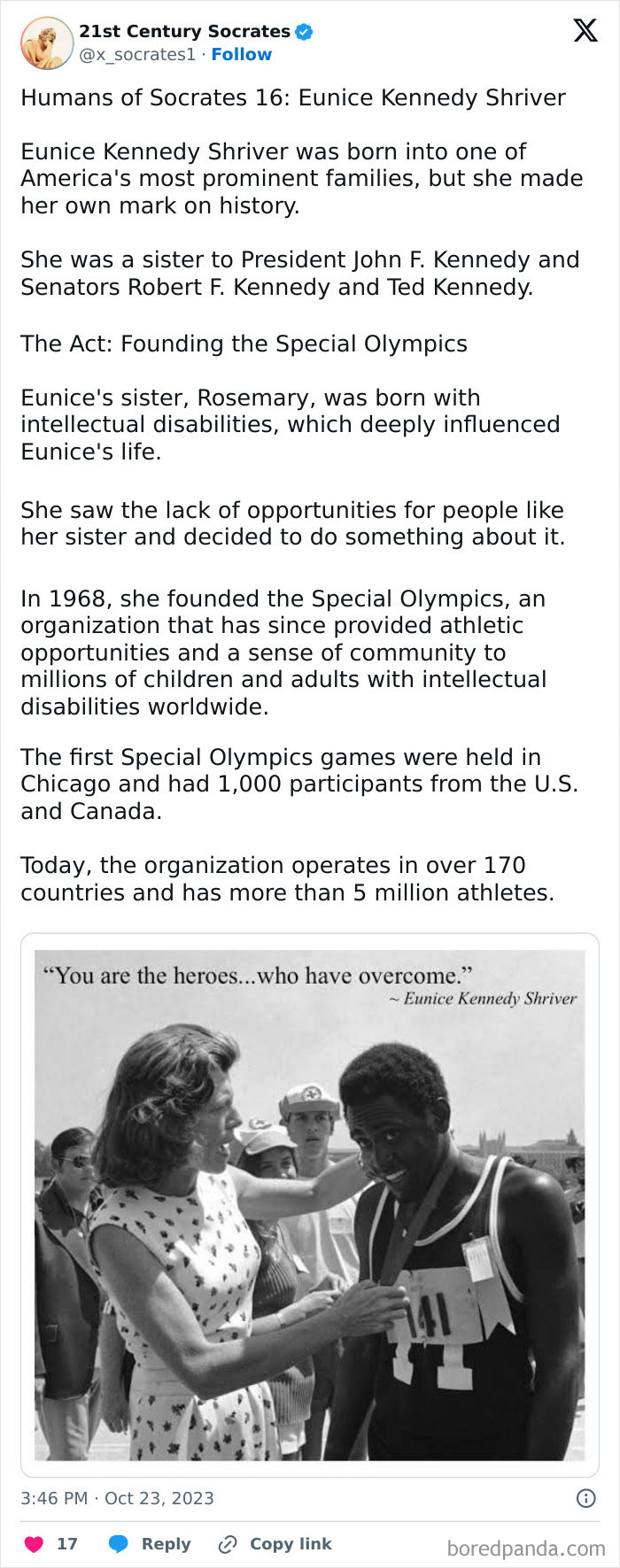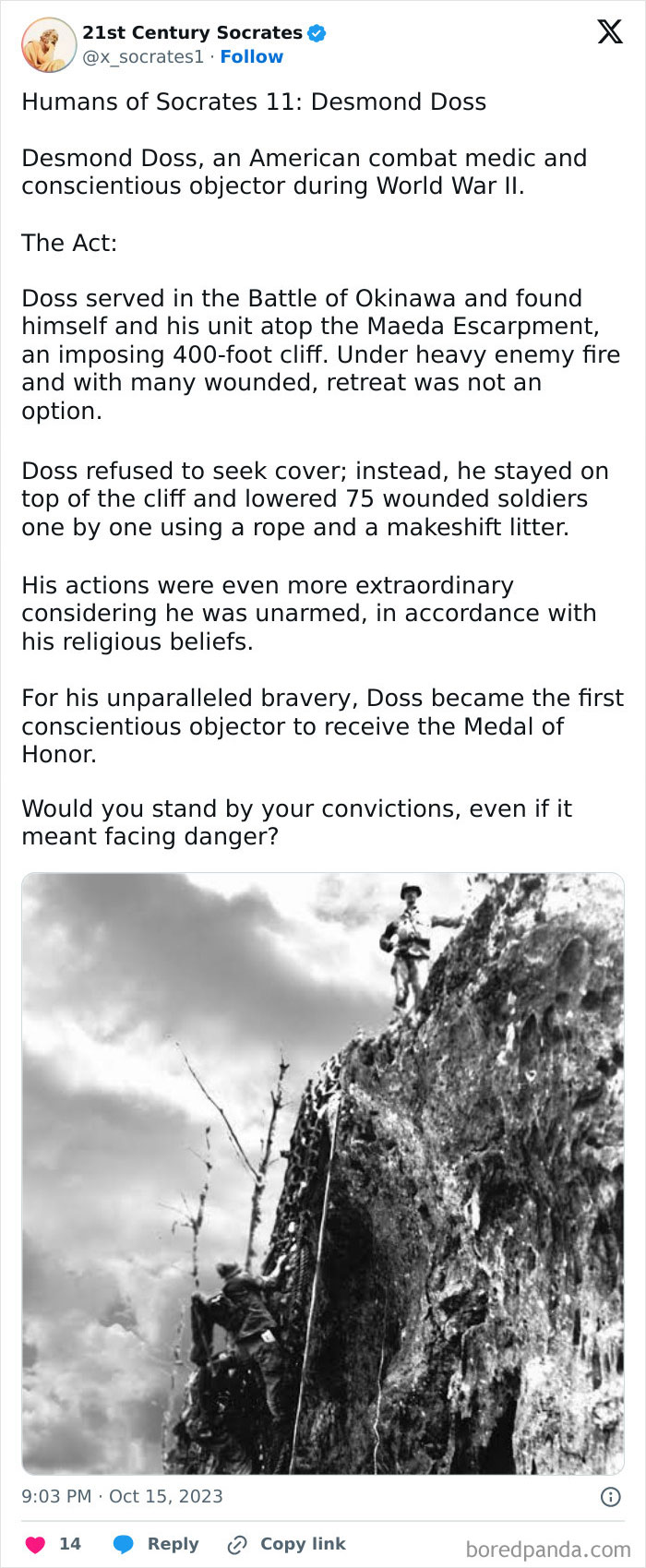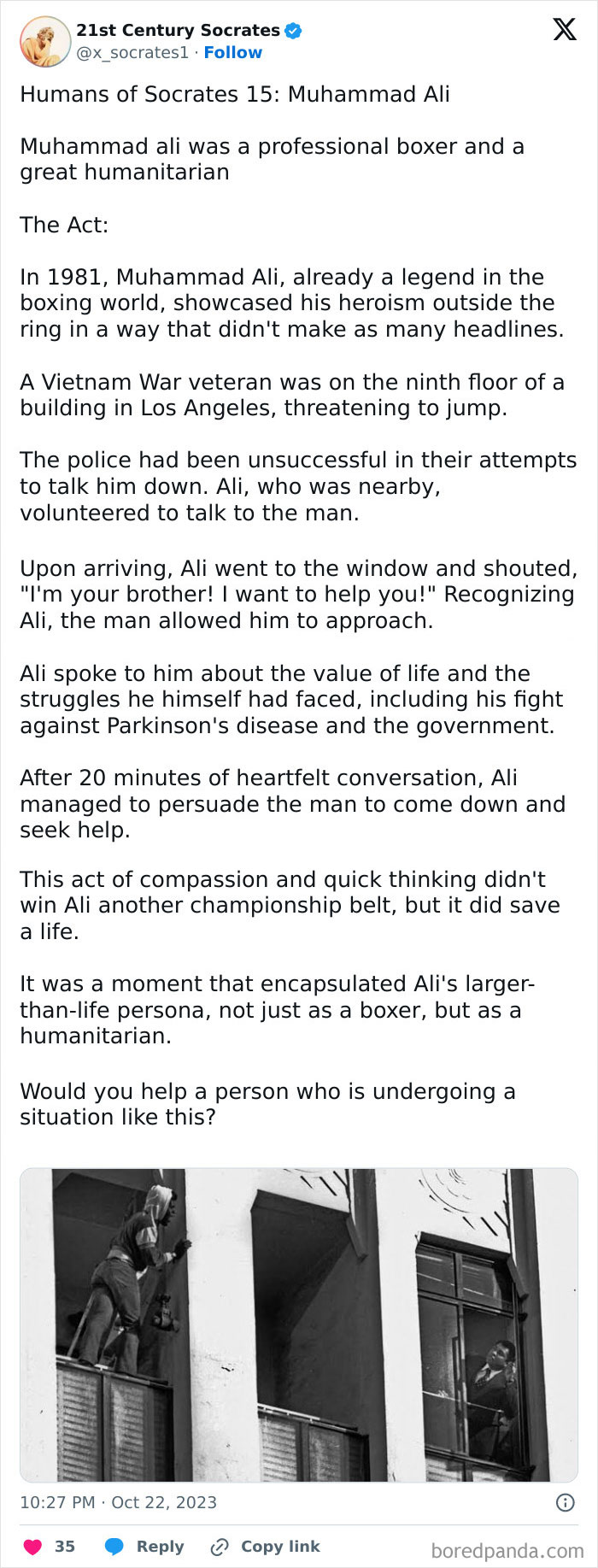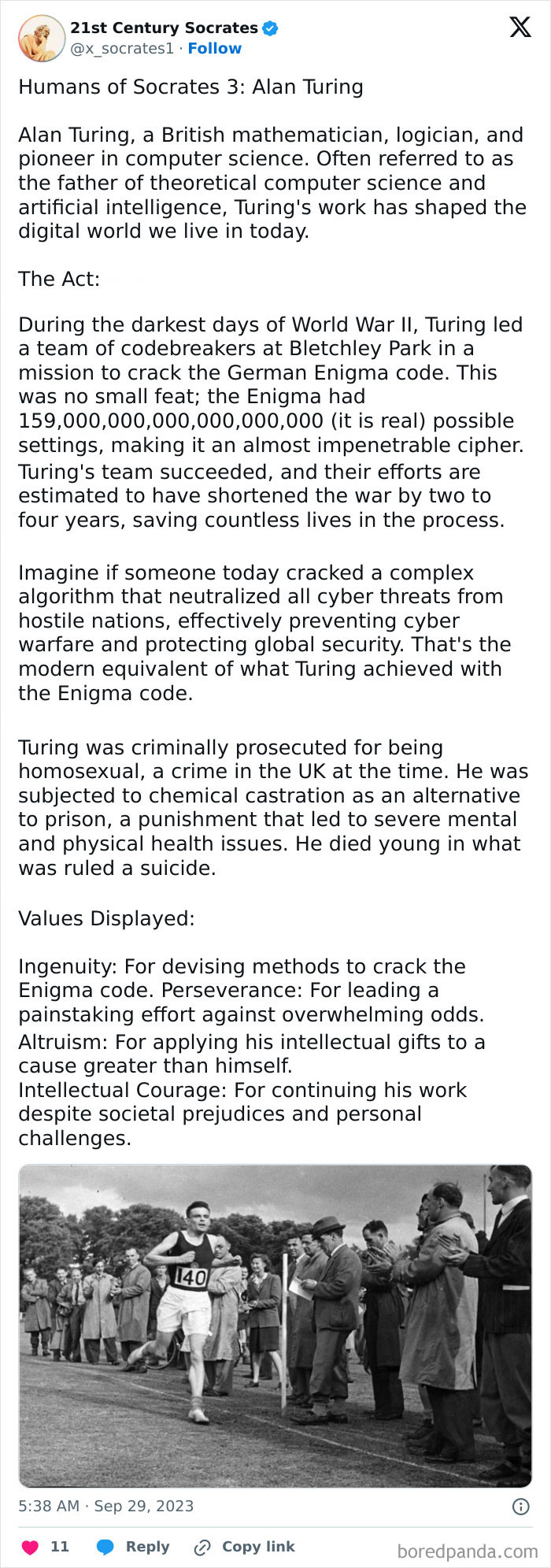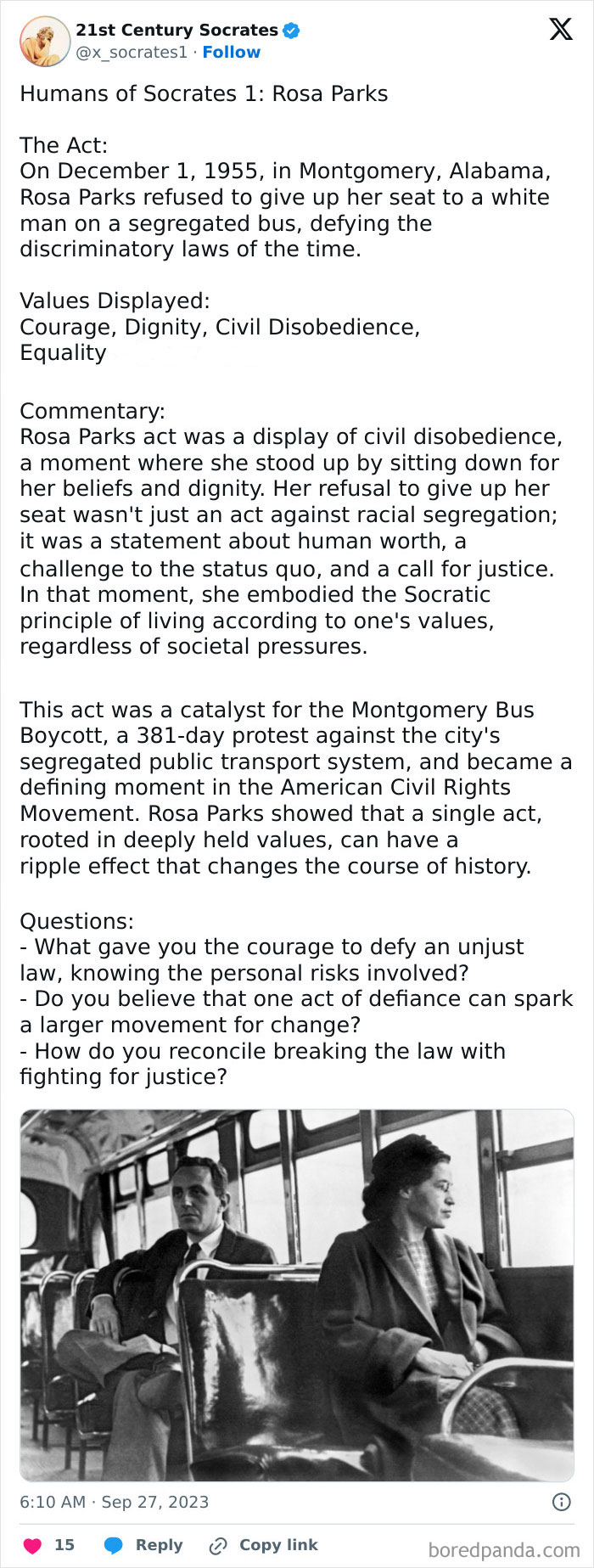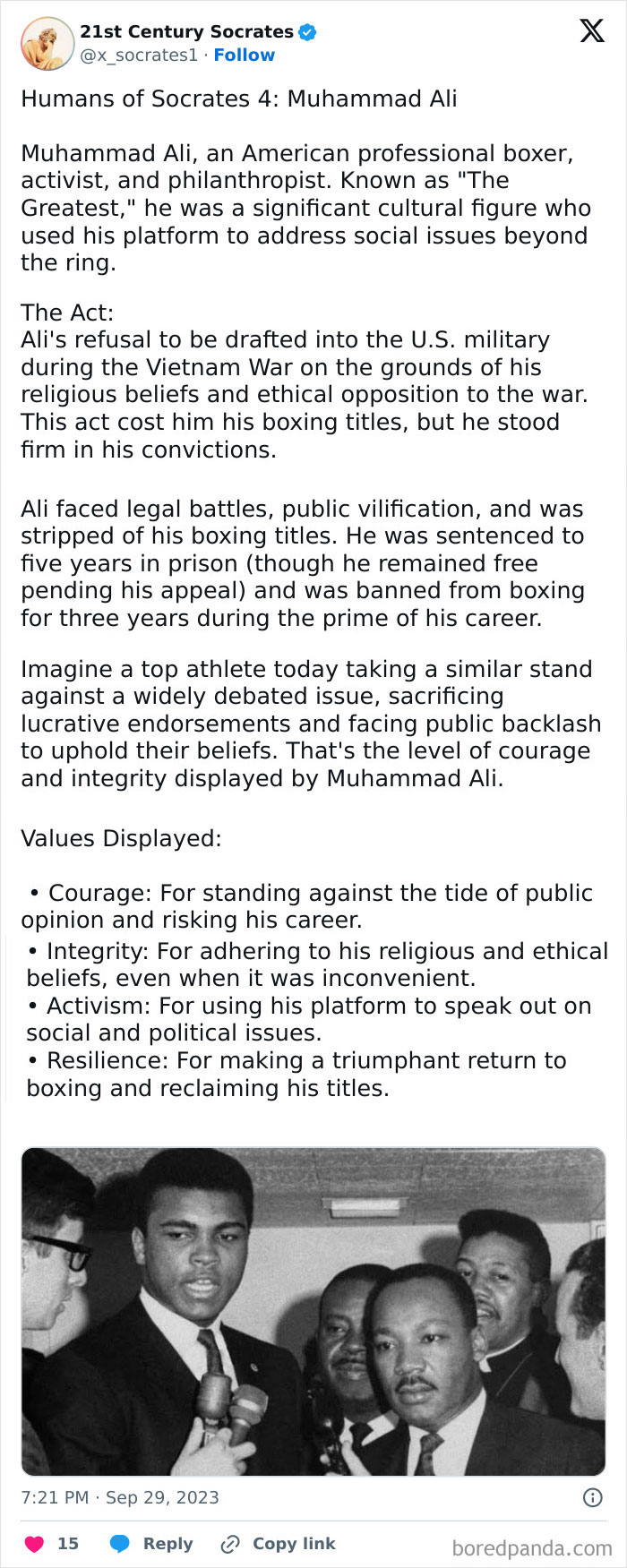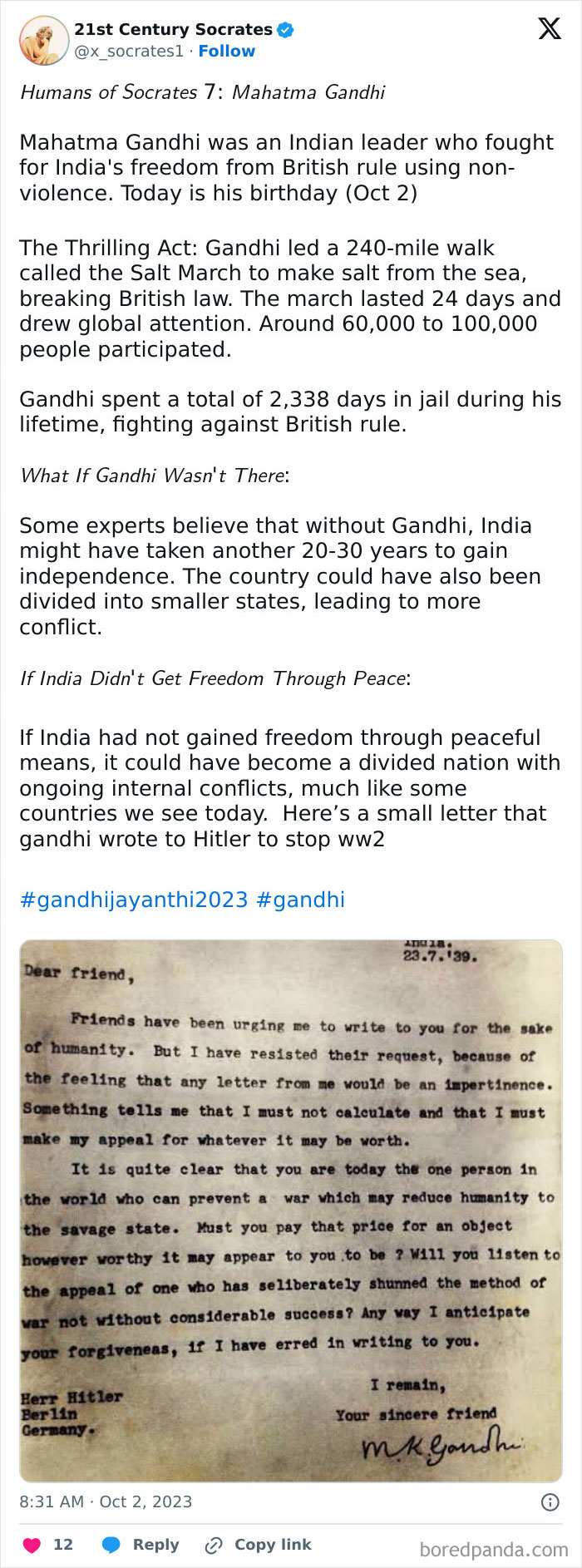Being a good person seems like an objective thing one can easily judge. Either the person acts like a decent human being or they don’t—it’s simple.
However, many philosophers would disagree with that statement and argue that things are more complex than just that. What is a virtue and what does being good really mean? Do good intentions mean good deeds and vice versa? It’s a topic of discussion that fascinates many.
The people in the following list do both great and awful things. A few also do awful things for the greater good. Are those things really that bad then? Are they bad people for doing them? The creator behind the 21st Century Socrates page tries to encourage this dialogue by discussing the values of these fascinating people. Bored Panda talked to him to see how this account came about. Scroll down to read the stories.
This post may include affiliate links.
When asked about the origins of the X account, the author, who simply wants to be identified as "21st Century Socrates," said that, in a way, it all goes back to his childhood. “As a kid, I read about Socrates and his incredible commitment to values and wisdom. My parents always used to say not to prefer money over values or integrity, and that’s how I grew up.”
“One day, I was searching for a Socrates-related account on X from my friend's account but to my surprise, there wasn't one dedicated to him. So I decided to create it myself.” At the moment, the account has over 4,000 followers.
Wow! I'm even more impressed as I would be squeamish about bringing the red ants along.
Just think of the phenominal strides in science and arts that have been squandered because of the rascist numbnuts..
For those unfamiliar with Socrates, here’s a brief rundown of his philosophy.
Socrates valued knowledge over everything else. For him, seeking out knowledge and wisdom was the prime reason to live. He also loved defining things and getting into discussions about it. What is good? What is evil? What is courageous?
These questions were also what got him in a lot of trouble. You see, to look for answers, he usually would go to knowledgeable people like politicians and poets and ask them about beauty and justice and other things that mattered to him.
Tom Ecker, author of Olympic Facts and Fables, says he asked Owens in 1965 point-blank about the story. ... "Jesse Owens admitted to us that he had not met Luz Long until after the competition was over," Ecker says. 'Those stories are what people like to hear, so you tell 'em,' "
I would hope I could have done this, but I don't know. The organization and planning it must have taken would have probably been beyond my capabilities.
I still vividly remember doing the Terry Fox “run” during elementary school (here in Canada) where we’d all go out with the teachers and take a long walk around the blocks surrounding the school in honour of him. Definitely a national treasure and I still have mad respect for him to this day.
His questions were clever and would often trip up these high-ranking people that wanted to appear smarter than everyone else. Socrates would often walk away from these conversations concluding that they knew nothing, humiliating them in the process.
In a way, it is no surprise that a child would be fascinated by something like that. It is also not a surprise that questioning authority led to Socrates' death. The higher-ups didn’t like the disruption that he was causing, so soon enough he was found guilty of blasphemy and corrupting the youth and was sentenced to die by poisoning.
He, and his wife, are recognised as heroes in Israel. Both were given citizenship and pensions (but they didn't live together).
"Humans of Socrates 9: Simon the Cat"? Everyone knows cats are often (usually? always?) better than humans, so he should have had a much higher honour. 😉
The fact that Socrates valued knowledge so much and saw it as the greatest virtue impacted his perception of good and evil. He believed that whatever people did, it always came from good intentions. And if they ever committed any wrongdoings, it was purely out of ignorance or lack of knowledge.
In other words, if you steal, you don’t do it to rob the shop of their goods, you do it to so that you have something you need. You don’t lie because you enjoy tricking people, it is because it makes your life, at least in that moment, more convenient. You ignore the fact that you might get caught or that it may land you in more hot water in the future. It is benefiting you now, which means you have positive, albeit selfish, reasoning.
I was diagnosed with my first ulcer in the very early 70s, as a young child. This man made a world of difference in my life. Conventional medical thinking in the 60s and 70s said that ulcers were caused by stress and diet. A bland, "white" diet was prescribed. Milk, white bread, cottage cheese, and never anything flavorful or spicy. Needless to say, it didn't help. Getting antibiotics for my ulcers in the late 80s did. A truly life changing moment for me.
Rosemary Kennedy didn't have "an intellectual disability" she had mental health issues, which lead to her dear old daddy Joe, ordering a Lobotomy for her in 1941 in an effort to "calm her down" so she wasn't an embarrassment. The "procedure" was a disaster, Rosemary was left almost completely disabled, dear old dad sent her to a psychiatric facility for 7 years, before sending her to catholic care home. He told none in the rest of the family about any of this, it was presumed that she had simply "run off" He didn't see her for the rest of his life, and the rest of the family went two decades presuming her dead or simply missing before learning what their father did upon his having a stroke. Modern medicine has deduced that Rosemary was likely BIPOLAR. To say that she had "intellectual disabilities" implies she simply was dealt a bad hand, perpetuates the myth of the Kennedys, and dismisses the immense progress of society in regards to not only mental health, but the treatment of women
This explains why 21st Century Socrates uses his platform to amplify stories of both do-gooders and criminals. Both of those can be seen as sort of heroes, depending on how you look at it. Yet, the creator doesn’t even want to focus on the person themselves. He likes to emphasize the stories and actions of the people and how it highlights their values.
So, how does one find these types of stories? By doing a lot of reading. “A major source of my inspiration comes through X, documentaries, and online websites. When I see a great act, I just add them to my schedule of people to cover.”
Enigma code was broken by Marian Rejewski. Turnig developed the solution presented to him by Rejewski, which was later confirmed by Sir Dermot Turing in his book. https://www.nature.com/articles/d41586-018-06149-y
Interesting facts: 1) He's now on our money. and 2) My mother was on the same ward as him in 1990 in the Park Lane Clinic. She said he would come past in his dressing gown and greet everyone. I didn't see him (was too shy to even go near his room) but I did see Winnie when she walked past! And when Walter Sisulu came to see him, my mother piped up, "Hello, Mr Sisulu!" My mom said he looked at her like, 'How do you know who I am?' My mom said to me, "I watch the news! I knew who he was!!" LOL.
Yes, Claudette Colvin did not receive the same attention as Rosa Parks, but given the attitude of white people at the time, it made more political sense to use Rosa Parks to highlight bus discrimination. She was in no less danger than Claudette Colvin, however, and was still very brave for doing what she did.
“The thing I like in them is the courage to do a thing which maybe 99% of the humans would pass on. What gave them that courage? I am really fascinated by that aspect,” says 21st Century Socrates. He believes that the reason behind such acts of bravery is often strong character and values.
Bit of copy and paste going on in these. The Sarah Sands article has the same "It didn't slow down the nightmares....."
Meanwhile, look at the way Kaepernick was treated. We have short memories...
What do you think about these acts of courage? Are they inspiring? Are they fascinating? Do they provoke discussions about virtues? If so, then 21st Century Socrates is doing his job right.
But she's only concerned for the rights of ethnic Burmese. She fine with the murderous persecution of minority tribes in the North by her own military in recent years.
Gandhi had feet of clay. He firmly believed in the caste system, just not untouchability."These being my views I am opposed to all those who are out to destroy the caste system.”
Sorry, but not quite in the same league as the others, not to mention her statements about her beliefs regarding human sexuality.
There were a few people in this list whose lives weren't actually as described above.
Read up three names.. Dr Anandibai Joshi and Mahatma & Savitribai Phule... The first is India's first woman doctor... her story is inspirational. The Phule couple started the first girl's school in India and paved the way for women's education..
How silly to compile a post of things that Allen Packard already knew.
Load More Replies...There were a few people in this list whose lives weren't actually as described above.
Read up three names.. Dr Anandibai Joshi and Mahatma & Savitribai Phule... The first is India's first woman doctor... her story is inspirational. The Phule couple started the first girl's school in India and paved the way for women's education..
How silly to compile a post of things that Allen Packard already knew.
Load More Replies...
 Dark Mode
Dark Mode 

 No fees, cancel anytime
No fees, cancel anytime 











